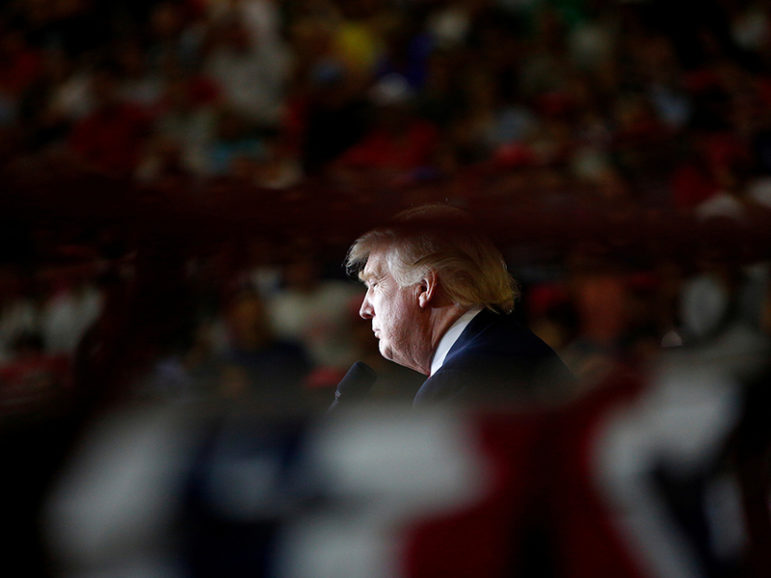(RNS) Donald Trump really stepped in it this weekend in his comments directed toward Khizr Khan and his wife, Ghazala, parents of slain U.S. Army Capt. Humayun Khan, who was killed in action in Iraq in 2004.
But this particular exchange was not just another example of singularly bad judgment from Mr. Trump. It also signals the disturbing muddle that is U.S. foreign policy.
The Khan family symbolizes a certain kind of America – a multicultural land open to immigrants of every nation and creed, confident that these immigrants will become deeply patriotic Americans drinking deeply of freedom and democracy, and reverent toward soldiers and their families, especially when those soldiers die in American wars.
But this is not Donald Trump’s apparent vision of America. In this way as in so many others, Trump has shattered deeply established paradigms in American politics. His rise makes it important to consider broader questions of how the U.S. relates to the wider world, 25 years after the end of the Cold War.
Since World War II, the major voices in both parties have agreed that U.S. national security is best advanced by promoting freedom, democracy and global free enterprise; fielding the most powerful military in the world; situating the U.S. at the center of a robust set of diplomatic, military and trading alliances; opening the U.S. to a broad population flow both to and from our country; and using force when necessary to advance security and humanitarian goals.
The Cold War determined the overall context, and tended to create both a broadly shared consensus and a range of permissible variations. Republicans tended to be somewhat more hawkish than Democrats, more unilateralist, more gung-ho in celebrating American virtue, more unequivocally pro-military.
Democrats tended to emphasize the use of U.S. money and power to advance global humanitarian goals. And, after Vietnam and Watergate, Democrats tended to be more suspicious of the U.S. government’s military adventures. That voice was heard in the “No More War” chants at the Democratic National Convention.
But still, since World War II, the U.S. foreign policy elites have carried forward a recognizable shared vision even as power has passed between the parties at the presidential level.
Hillary Clinton, here as in other areas, is the candidate of continuity. She sounds like a traditional centrist Democrat on foreign and military policy. If elected, she will likely continue forward with the elite consensus. The speech by retired Gen. John Allen at the Democratic Convention represented an especially fierce version of it.
If the Republicans had nominated someone like the hawkish South Carolina Sen. Lindsey Graham, it might have been a traditional election in the foreign policy area. He would have sounded more bellicose than Clinton in some areas, and she would have had to defend her toughness and willingness to use force.
But instead the GOP nominated Trump.
His impulses are isolationist, authoritarian and nativist. He does not trust the foreign policy establishment any more than the rest of the political establishment. He sometimes sounds like the “No More War” chanters at the Democratic Convention, and other times quite aggressive.
He is less about democratic values than about authoritarian strength; less about global engagement than about hunkering down behind American borders; less about America as a participant in international flow of people and ideas and more about going it alone; less about honoring trade agreements and alliances and more about starting over with a transactional approach.
Today, after two decades of unsuccessfully attempting to impose our will in the Middle East and in the battle against radical Islamist terrorism, it is a good time for someone to challenge the once-reigning foreign policy consensus.
No one has figured out how to lance the boil of Islamist terrorism, or how to stabilize the Middle East, or how to encourage a version of global capitalism that does not despoil the weak, the poor and the environment, not to mention the American manufacturing base. And then, of course, there is Vladimir Putin’s Russia, raising questions as to whether the Cold War really ended at all.
Perhaps the remainder of this election can offer insights into a better path forward, something not quite like the consensus elite approach and certainly not like the Trumpian alternative. Having a debate about those issues would be very good for us. I wonder if we are up to it.
(David Gushee is Distinguished University Professor of Christian Ethics and director of the Center for Theology and Public Life at Mercer University, and a columnist who writes the Christians, Conflict and Change column for RNS)





